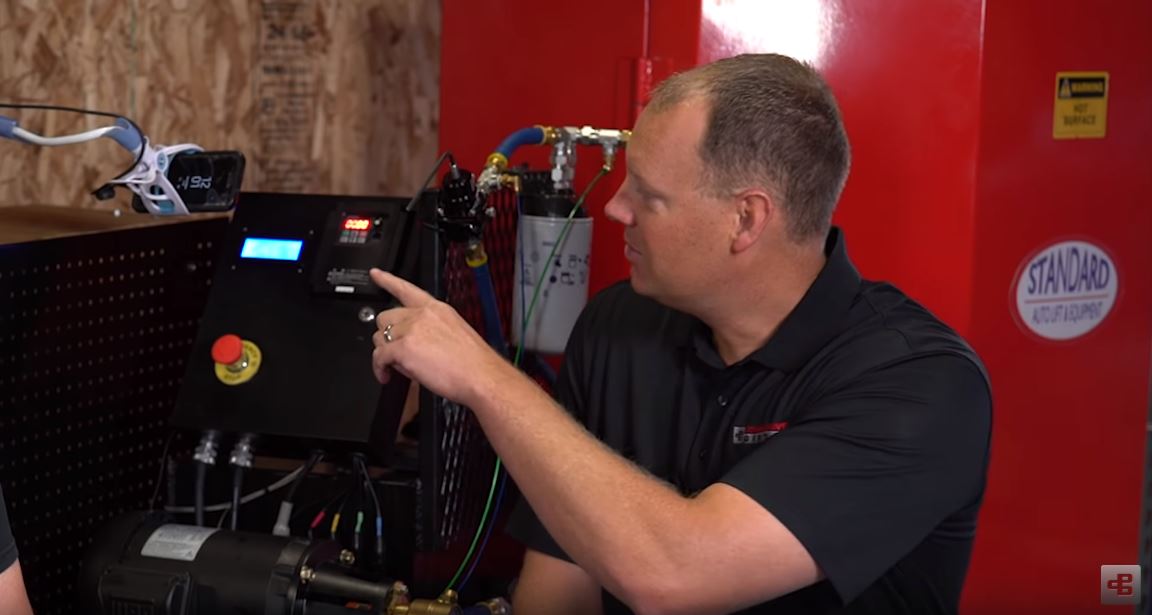Uncategorized
Predator Lift Pump Bench Test 1
Welcome to the first test of our new lift pump test series. We made a mechanical lift pump and needed a way to verify its performance. With this series of tests we will verify our pumps performance and test out some electrical pumps as well. This will allow us to give you accurate data on our Predator Lift Pumps.
Setting Up the Lift Pump Tests
We will be using a custom made lift pump testing system that will allow us to have empirical data to capture, review, and compare across all our tests. The test rig is basically comprised of a three-phase motor directly coupled to the Predator Lift Pump. It’s controlled by a variable frequency drive so we can control the speed of the test rig. We wanted to ensure this provides accurate test results.
During the tests, we are going to capture and log the following data:
- Engine RPM
- Delivered Gallons Per Hour
- Volumetric Efficiency
- Injection Rate
- Horsepower Draw
- Fluid Density (Expressed in Pounds per Gallon)
- Pressure Before and After the Filter
We’re going to test the pump across a specific RPM range: 2,000 – 6,000rpm. At each point we will adjust our regulator to ensure we maintaining pressure on the clean side of the filter. This will allow us to more easily see what the pressure drop is across the filter.
Test 1: 2,000rpm, 4,000rpm, and 6,000rpm at 40psi
The first test is running at simulated 2,000rpm, 4,000rpm, and 6,000rpm at 40psi. First we’re starting at 2,000rpm.
You can see that at 2,000rpm, we’re running at about 87% efficiency and supporting approximately 942cc’s.
Moving up to 4,000rpm, we’re getting about 5lbs of differential pressure across the filter. At this point we’re maintaining about 87% efficiency and 179 gallons per hour, which is about where you average street truck will max out.
When we go up to 6,000rpm, we still only see about 10lbs of differential pressure across the filter. We’re up to about 266 gallons per hour and running at about 86.5% efficiency.
Test 2: 2,000rpm, 4,000rpm, and 6,000rpm at 80psi
The second test bumps the Predator Lift Pump pressure up to 80, and we’ll repeat 2,000rpm, 4,000rpm, and 6,000rpm engine speeds. On the first test at 2,000rpm, we’re seeing about 84.75% efficiency supporting about about 915cc injection rate and 88 gallons per hour.
At 4,000rpm we again have about a 5lb pressure drop. We are moving about 178 gallons per hour and have about an 86% volumetric efficiency.
When we bump it up to 6,000rpm, we hit about 265 gallons per hour and 85% efficiency. Additionally, we’re looking at around 920cc injection rate.
Test 3: 2,000rpm, 4,000rpm, and 6,000rpm at 120psi
One thing to keep in mind with these pumps as we push to 120psi is that they have an internal relief valve as a safety feature.This is useful as a primary stage of pressure regulation if you want to run multiple stages of pressure regulation. Our pumps come set for the relief valve to crack at 60psi and be completely open at 80psi. For demonstration purposes, we have disabled the relief valve to show you what the pump is capable of.
The first run at 2,000rpm gives us 82% efficiency and 85 gallons per hour. This is a little lower than what we have seen in earlier tests, but the results will come back up as we raise the RPMs. The main reason for that is that these are vein pumps. The veins are dependant on centrifugal force to be fully expanded against the liner, creating the sealing inside the pump.
When we bring this pump up to 4,000rmp, you’ll notice we still only have a five pound pressure drop across the filter. The lift pumps volumetric efficiency has com up to around 85%, supporting about 920cc injection rate, running about 175 gallons per hour.
Finally, we bump the test up to 6,000rpm. We’re seeing around 262 gallons per hour, 85% efficiency, 920ccs, and about 10lb pressure drop across the filter.
With these tests complete, we’re happy with the performance across all the pressure and rpm ranges. Plus, now you know exactly what we’re selling and what you’re buying with one of our Predator Lift Pumps.
If you have questions about our Power Drive Diesel Predator Lift Pumps or any other product, please give us a call at 435-962-9555 or text us at 435-962-9506, or hit us up on Facebook, Instagram, or leave a comment below. We try to answer any and all questions as quickly as possible.

